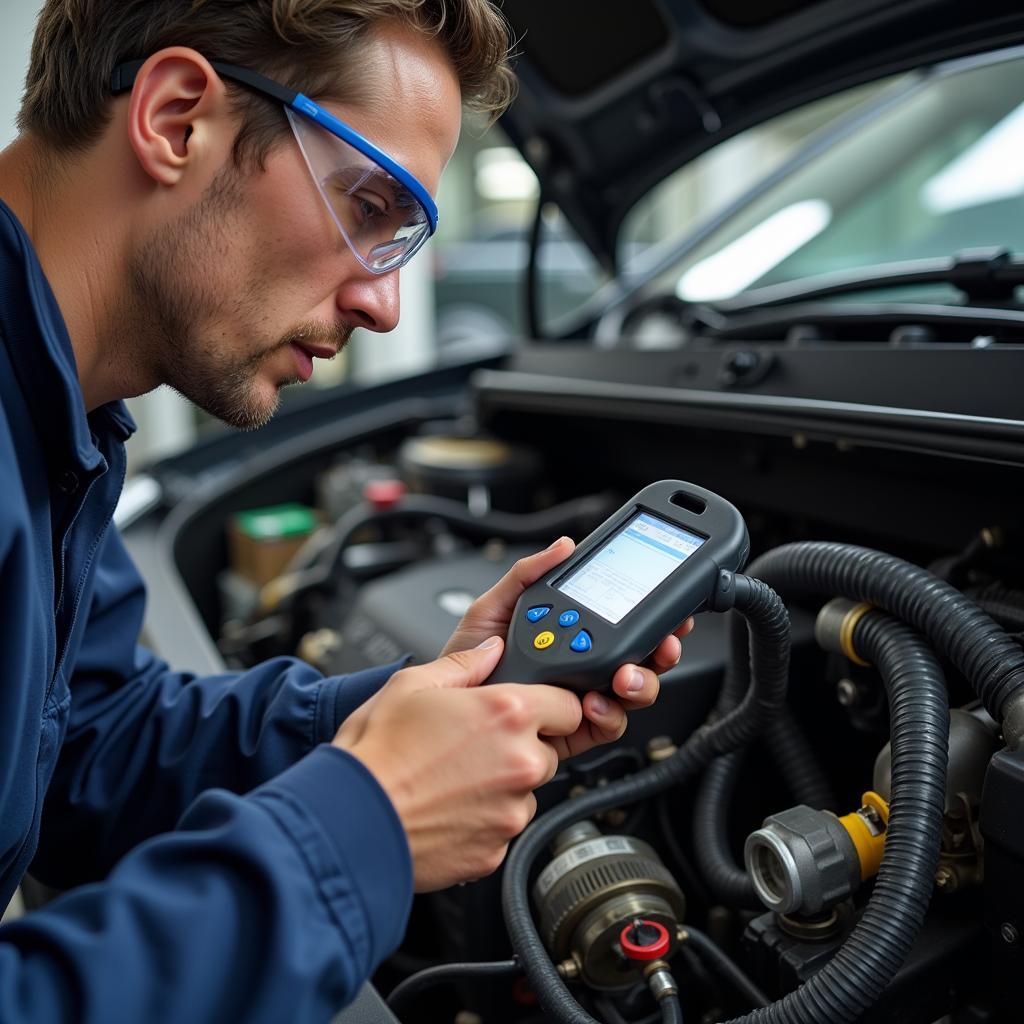Servicing your car’s LPG system is crucial for maintaining its performance, efficiency, and safety. While LPG is a fantastic alternative fuel source, regular maintenance is essential to keep your vehicle running smoothly. This comprehensive guide will walk you through the key aspects of car LPG system servicing, empowering you to make informed decisions about your vehicle’s upkeep.
Understanding Your Car’s LPG System
Before diving into the specifics of servicing, let’s familiarize ourselves with the basic components of a typical car LPG system:
- LPG Tank: Stores the LPG fuel, usually located in the trunk or spare wheel well.
- Vaporizer/Regulator: Converts liquid LPG into vapor and regulates its pressure before it enters the engine.
- LPG Injectors: Deliver the vaporized LPG into the engine’s intake manifold.
- ECU (Electronic Control Unit): Manages the switch between gasoline and LPG and controls the LPG injection process.
- Filters: Remove impurities from the LPG fuel, protecting delicate engine components.
Essential Car LPG System Service Tasks
Regular servicing of your car LPG system generally involves the following key tasks:
1. LPG Filter Replacement
Just like any fuel system, LPG systems use filters to trap dirt and debris. Over time, these filters can become clogged, restricting fuel flow and impacting performance. Replacing them regularly ensures optimal fuel delivery and protects the engine from damage.
2. Inspection of LPG System Components
A visual inspection of all LPG system components is crucial to identify any signs of wear and tear, leaks, or damage. This includes checking the tank, lines, connections, and all other components for any abnormalities.
3. Testing the LPG System Pressure
Maintaining correct LPG pressure is vital for efficient combustion and overall system performance. A qualified technician will use specialized gauges to check the pressure at various points in the system, ensuring it falls within the manufacturer’s recommended range.
4. Checking for LPG Leaks
 Mechanic Checking for LPG Leaks
Mechanic Checking for LPG Leaks
LPG leaks pose a serious safety hazard. Technicians use specialized leak detection equipment to identify even the smallest leaks. This might involve a sniffer tool to detect escaping gas or a soapy water solution applied to connections to look for bubbling.
5. ECU Diagnostics and Software Updates
Modern LPG systems often have sophisticated ECUs that control various parameters. A diagnostic scan can reveal any fault codes stored in the ECU, helping pinpoint potential issues. Additionally, manufacturers may release software updates to improve performance or address known issues.
Frequency of Car LPG System Servicing
The recommended service intervals for your car LPG system can vary depending on the manufacturer and model of your vehicle. However, a good rule of thumb is to have your LPG system serviced at least once a year or every 15,000 kilometers, whichever comes first.
Benefits of Regular Car LPG System Servicing
- Improved Fuel Efficiency: A well-maintained LPG system ensures optimal fuel combustion, leading to better fuel economy.
- Enhanced Performance: Clean filters, correct pressure, and properly functioning components contribute to smoother engine operation and improved performance.
- Extended Lifespan of Components: Regular servicing helps prevent premature wear and tear on LPG system components, potentially saving you costly repairs in the long run.
- Reduced Emissions: A properly maintained LPG system burns cleaner, reducing your vehicle’s environmental impact.
- Increased Safety: Routine inspections and leak checks are crucial for identifying and addressing potential safety hazards associated with LPG systems.
Choosing a Qualified LPG System Technician
When it comes to servicing your car LPG system, it’s essential to choose a qualified and experienced technician. Look for a mechanic or service center that specializes in LPG systems and has a proven track record.
Conclusion
Regular servicing of your car LPG system is not just an option; it’s a necessity. By investing in routine maintenance, you ensure the optimal performance, efficiency, safety, and longevity of your vehicle’s LPG system. Don’t wait for a problem to arise; schedule a service appointment today and keep your LPG-powered car running smoothly for years to come.
FAQs about Car LPG System Servicing
1. How much does it cost to service a car LPG system?
The cost of servicing can vary based on the service provider, your location, and the specific tasks involved. It’s best to contact a few reputable service centers for quotes.
2. Can I service my car LPG system myself?
While some basic maintenance tasks might be possible, it’s generally recommended to have your LPG system serviced by a qualified technician for safety and warranty purposes.
3. How do I know if my car LPG system needs servicing?
Signs that your LPG system may need servicing include: reduced fuel efficiency, engine performance issues, the smell of gas, unusual noises from the LPG system, or difficulty starting the engine.
4. What are the common problems with car LPG systems?
Common problems include: clogged filters, faulty injectors, leaking components, and issues with the ECU.
5. How long does a car LPG system last?
With proper maintenance, a car LPG system can last for many years, often exceeding the lifespan of the vehicle itself.
Still have questions?
Check out these related articles on our website:
Need personalized assistance? Contact our team of experts 24/7 via WhatsApp: +1(641)206-8880 or Email: [email protected].

